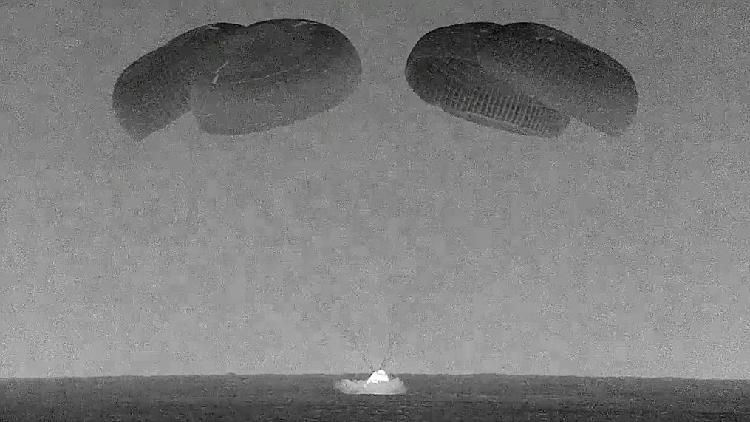SpaceX Team Comes Back to Earth Following First Private Spacewalk
SpaceX's Polaris Dawn mission, notable for achieving the first spacewalk by non-government astronauts, came to a close early Sunday with a splashdown off Florida's coast.

The Dragon spacecraft made its re-entry into the ocean at 0737 GMT, as shown in a live webcast, and a recovery team was deployed in the pre-dawn hours to retrieve both the capsule and its crew.
The capsule was lifted from the water and onto the recovery vessel about 30 minutes later.
Following quick medical evaluations, SpaceX engineer Anna Menon was the first to exit the capsule, smiling and waving, followed by her fellow engineer Sarah Gillis, pilot Scott Poteet, and commander Jared Isaacman. They were scheduled to be transported to land via helicopter.
"Happy, healthy, home," the Polaris Program stated on X. "A new era of commercial spaceflight dawns, with much more to come."
The four-member crew, led by fintech billionaire Isaacman, launched on Tuesday from the Kennedy Space Center, traveling farther into space than any humans had in the past 50 years as they navigated the hazardous Van Allen radiation belt.
They achieved a maximum altitude of 1,400 kilometers, which is over three times higher than the International Space Station and the farthest distance humans have been from Earth since the Apollo moon missions.
After completing their extravehicular activity, the crew conducted approximately 40 science experiments. Notably, they inserted endoscopic cameras through their noses and into their throats to image their airways, helping to enhance the understanding of how long-duration space missions affect human health.
Additionally, they showcased connectivity with SpaceX's Starlink internet satellite constellation by transmitting a high-resolution video of Gillis performing "Rey's Theme," composed by John Williams for "Star Wars," on the violin back to ground control.
Polaris Dawn marks the first of three missions in the Polaris program, a partnership between Isaacman and SpaceX.
The final mission of the Polaris program is set to be the inaugural crewed flight of SpaceX's Starship, a prototype next-generation rocket pivotal to CEO Elon Musk's ambitions for interplanetary travel.
Anna Muller contributed to this report for TROIB News
Discover more Science and Technology news updates in TROIB Sci-Tech












